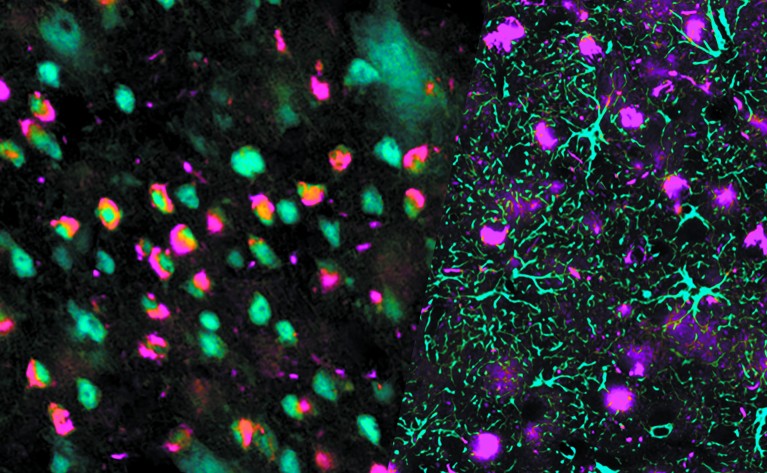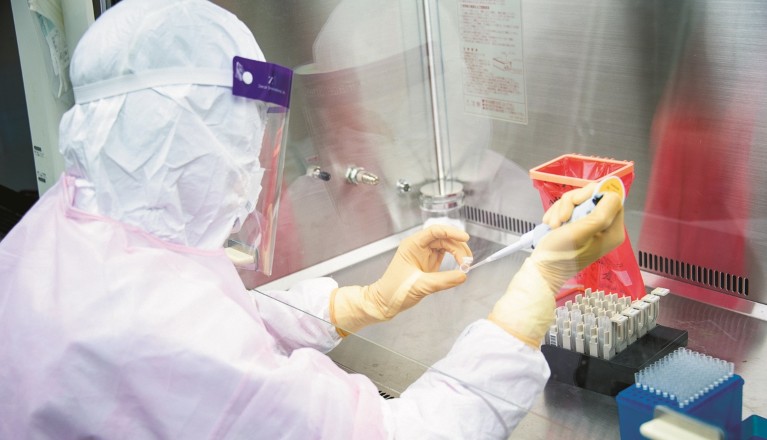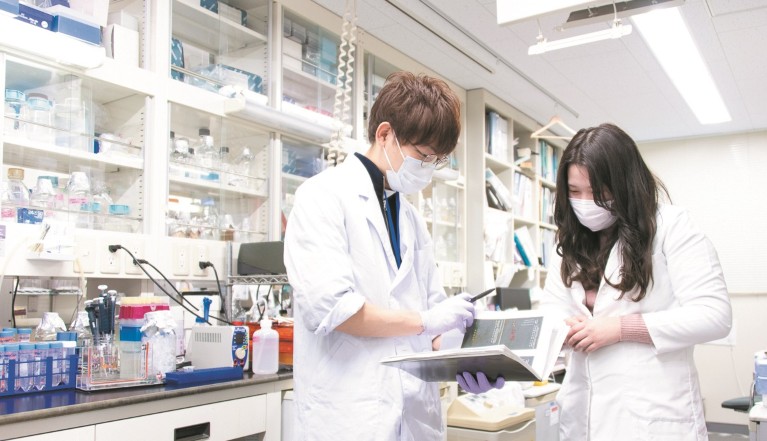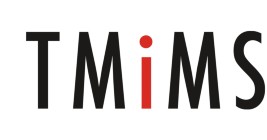Contemporary global health challenges highlight the need to bring multiple disciplines to medical research. Tokyo Metropolitan Institute of Medical Science (TMIMS) brings together diverse expertise to find and implement solutions for health-related problems common to large urban areas and developed countries.
“We pursue basic research in the molecular and cellular mechanisms underlying disease,” says Hisao Masai, director general of TMIMS, “and collaborate with Tokyo Metropolitan Government (TMG) operated hospitals and clinics, which helps us translate basic research findings into technologies that can be used to predict, prevent, and treat health problems”.

α-synuclein fibrils (pink) injected into marmoset brain spread and form aggregates in neurons (green in left), but not in astrocytes (green in right).
Two research centres recently established by TMIMS—the Research Center for Genome & Medical Sciences and the Research Center for Social Science & Medicine—are accelerating genetic discoveries through bioinformatics approaches, and helping develop care systems for patients with dementia, mental health conditions, and incurable rare diseases, such as amyotrophic lateral sclerosis.
Tackling COVID-19
With the rapid spread of SARS-CoV-2, TMIMS joined global efforts to understand its pathogenesis and develop effective drugs and vaccines. A special COVID-19 team has developed a viral vector-based vaccine based on highly attenuated recombinant vaccinia virus. “Our vaccine candidate, now in preclinical testing, is expected to provide long-term protection against ever-evolving SARS viruses,” Masai says.
TMG’s design of disease control policies for the city is supported by TMIMS data. Working with 14 hospitals in the Tokyo Metropolitan district, the TMIMS COVID-19 team has screened blood samples of more than 20,000 people for antibodies against SARS-CoV-2. Monitoring the levels of antibodies in the general population helps determine the infection spread and to identify individuals who may be immune. “We are detecting the presence of antibodies against the spike protein of SARS-CoV-2 in 1.5-2% of the population,” says Masai.
TMIMS is also developing novel antivirals and examining factors that influence severe disease. “We are analysing SARS-CoV-2 genomes in collaboration with the National Institute of Genetics to monitor variations and also analysing patient proteomes to examine cellular changes due to infection,” Masai explains.

Wearing fully protective attire, a scientist conducts SARS-CoV-2 antibody screening assays to help determine infection spread.
Healthy longevity
In high-income countries populations are rapidly ageing, and middle-income countries are only a few decades behind. In Japan, almost 30% of the total population is over 65 and one in 7 is over 75. Research into medical issues of longevity, such as neurodegenerative diseases and cancer, is a top priority for TMIMS.
TMIMS embraces multiple approaches to improve the quality of life of elderly people. Research in the Department of Brain & Neurosciences showing how abnormal proteins aggregate and spread in neurodegenerative diseases will aid the development of disease modifying drugs. While scientists at the Research Center for Social Science & Medicine are developing standardized care programmes for patients with dementia. “Increasingly, more people will experience dementia,” says Masai. “We need to create a social system that allows patients to live as happily and healthily as possible.” The effectiveness of the institute’s home care support model is now being assessed in Tokyo.
New projects will focus on gene therapy treatments for cancer and on the effects of circadian rhythm disruption on longevity-associated diseases. “Deeper knowledge of how biological clocks change with age may improve the health and well-being of global ageing populations,” Masai says.

Graduate students benefit from collaborative opportunities in diverse disciplines.
Mental health in urban populations
Urban living carries a higher risk of developing depression, psychosis and generalized anxiety disorder. More time spent in an urban environment during childhood and adolescence increases the risk of developing mental illness in adulthood.
TMIMS has a large cohort study to examine the genetic and environmental factors associated with mental well-being from birth through to old age. “Studying how factors, such as diet and social behaviours, in adolescence are linked to mental state in later life helps to design interventions to improve the mental health of people in cities like Tokyo,” Masai explains.
TMIMS scientists are also studying developmental and cellular neurobiology to better understand neurological disorders. “We are exploring the molecular mechanisms and genetic determinants underlying learning and memory, addictive disorders, sleep disorders, neural repair and multiple mental diseases,” Masai adds. They recently showed how in newborns, subplate neurons form temporary synaptic connections with cortical neurons to control their migration in the developing cortex.
Celebrating a decade of multidisciplinarity
The year 2021 marks the 10th anniversary of TMIMS, created by merging three diverse medical institutes operated by TMG. “TMIMS brings together expertise in basic medicine, clinical medicine and social medicine to tackle a wide range of diseases using different approaches,” says Masai.
Additionally, TMIMS close relationship with Tokyo’s Center for Infectious Disease Control and Prevention (Tokyo iCDC) and the city’s metropolitan government, also helps it to address health needs. “With the uncertain outlook for the coming year, we will continue shaping public health policies, accelerating the clinical application of research results and updating the public with our latest findings,” Masai says.



 Collection: Nature Index 2021 Asia Pacific
Collection: Nature Index 2021 Asia Pacific